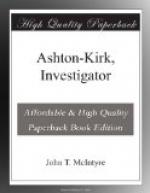Instantly the startled look vanished; a smile lit up the pale face, wanly.
“Of course not,” she cried. “You are interested in dreadful happenings—I had forgotten that. I suppose you are really quite delighted; and instead of my craving pardon I should be expecting praise, for putting you in the way of this one.”
She laughed lightly; a smile flitted across his keen face, as he rose and said:
“What has happened may make a change in the affairs of Allan Morris.”
She came to him and laid a hand upon his arm. Her coolness won his admiration.
“I beg of you to forget all that I told you yesterday,” she said. “I had been brooding so long that I had begun to fancy all sorts of impossible things. I see very clearly now that this man Hume could have had nothing of any consequence to do with Mr. Morris. It was a romance—a rather foolish fancy, and a very wild one.”
There was sweet seriousness in her manner; and the lurking smile still hovered about her lips. It was as though a return to reason had driven away the fears of the day before—the alarmed girl had given place to a sensible woman.
But behind all this, Ashton-Kirk could detect something else. The almost swooning terror of the girl who had spoken to him over the telephone was still there—held rigidly in check to be sure, but unquestionably there. While her lips smiled, the eyes sometimes betrayed her; and there was a tenseness about her that almost screamed. Her good-by was soft and kindly spoken; she held out her hand, frankly, and thanked him for his interest. There was nothing hurried in her manner; it was all smoothly and leisurely done. And yet he felt that if she had followed the impulse that filled her, she would have taken him, by the shoulder and bundled him from the room in order that she might be alone.
“Alone—to think,” he said, as he got into his car at the curb. “But to think about what?” Aloud he said to the driver: “Christie Place.”
By this time the early workers were beginning to thicken in the street; street cars were more frequent; the dull night hum of the city was growing in volume. The spark had set the car’s engine throbbing heavily, and the driver was about to start when a second vehicle drew up and Ashton-Kirk found himself looking into the alarmed face of young Pendleton.
“Heavens, Kirk!” cried the newcomer, as he leaped out, “has anything serious happened?”
“To whom?” asked the investigator, quietly, his eyes fixed upon the young man’s face.
“To Edyth, of course. Has any thing been seen of her?”
“I have just left her; she seemed a bit agitated, but perfectly well.”
A look of relief crossed Pendleton’s face.
“Oh!” said he. “All right. I was beginning to think that something was up. You see,” and here he lowered his voice, “I danced with her about midnight at Mrs. Barron’s; about two o’clock her aunt, Mrs. Page, came to me in great distress and said she was strangely missing. She had slipped away somewhere without a word.”




